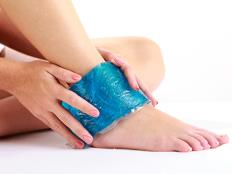
It's rare for runners not to experience at least one sidelining injury in their lifetime. The trick to staying injury-free isn't just how you treat your body in the hour or so each day that you're running, but in the other 23 hours that you're recovering.
Ice, nutrition and sleep all play an important part in the recovery process. Without all three, your time on the road or trail could be cut short this year.
Ice
Ice bathing and isolated icing help to fight the microtrauma of the muscles caused by high mileage and speed work. Microtrauma, in the form of small tears to the muscle fibers, can leave runners feeling sore and stiff. The cold of the ice bath helps to reduce swelling and draws blood to the sore areas, which may hasten the healing process.
To ice bathe correctly, fill your tub with cold water and add ice until the water temperature is around 55 to 60 degrees Fahrenheit. Adjust the temperature to be a little warmer if you aren't used to frequent ice bathing.
Submerge your body from the waist down in the tub and remain for about 10 minutes, gently swishing your legs back and forth on occasion to keep the water from warming up.
More: 8 Ice Baths Dos and Don'ts
Nutrition
Proper nutrition helps repair. It's important to know not only what to eat, but when to eat it. Eating immediately after a run is particularly important and will keep your body healthy enough to endure the rigors of training.
Eating at least every five hours to keep your caloric intake steady throughout the day helps your body to rebuild and repair the muscles that are broken down while running. Focus on eating 60 to 90 grams of muscle-building protein and plenty of carbs throughout the day. The Academy of Nutrition and Dietetics recommends that an adult athlete consume 0.5 to 0.7 gram of carbohydrates per pound of body weight within the first 30 minutes after a workout.
On top of the Academy of Nutrition and Dietetics' recommended daily carb intake of 130 grams of carbs per day, an athlete should consume 2.3 to 3.2 grams of carbs per pound of body weight for light to moderate training that lasts less than an hour, and 3.2 to 4.5 grams per pound for heavy or faster training at high intensity.
Within the first 30-minute window after your run, it has been suggested to ingest a few hundred calories of food with a carb-to-protein ratio of 4-to-1, although that specific ratio has yet to be scientifically tested against other ratios. Even though a workout or long run can leave some runners nauseated or with a suppressed appetite for a few hours, it's important to consume those calories even if you don't feel hungry.
- 1
- of
- 2
About the Author

Get ACTIVE on the Go


Couch to 5K®
The best way to get new runners off the couch and across the finish line of their first 5K.
Available for iOS | Android






Discuss This Article